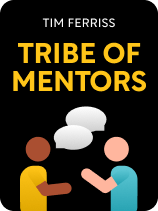

This article is an excerpt from the Shortform book guide to "Tribe of Mentors" by Tim Ferriss. Shortform has the world's best summaries and analyses of books you should be reading.
Like this article? Sign up for a free trial here.
What do you do when you find it hard to focus? How successful are you at changing your attitude when you should?
Sometimes, you feel too tired or scattered to focus and do what you need to do or even want to do. This happens to everyone. Tim Ferriss, in his book Tribe of Mentors, shares how several successful people put themselves back into a positive, productive frame of mind when they get off track.
Read on for advice on how to recenter yourself and return to the task at hand.
Tip #1: Take a Break
The first piece of advice on how to recenter yourself comes from filmmaker Darren Aronofsky. He contends that you should never feel guilty about taking a break from work when you need it. When you’re having an off day and feel stuck, just go do something else—anything that allows your mind to wander and rest. Even if you’re not thinking about the problem, you’ll be unconsciously working through it in the back of your mind.
(Shortform note: Even if your unconscious mind works on problems while you’re taking a break, you may not want to spend all your breaks away from work idly daydreaming. Consider practicing what Cal Newport calls “productive meditation” in Deep Work: When doing a mindless physical task such as mowing the lawn or vacuuming the floor, continually refocus your mind on a single problem you’re trying to solve. He asserts that doing this regularly will strengthen your ability to focus. That said, Newport emphasizes that this isn’t a replacement for your time spent away from work, as your unconscious mind does solve problems when wandering—it’s just a way to increase your productivity in a life that already includes a healthy amount of rest.)
Similarly to Aronofsky, author and former skier Kristen Ulmer argues that when your body and mind start to resist the work, the best course of action is to stop working and listen to them. Do nothing but live in the moment, allowing yourself to get distracted and paying attention to how it feels. After living mindfully for long enough, your motivation to tackle the work will return—whether it takes a few minutes or a few days.
(Shortform note: In The Willpower Instinct, Kelly McGonigal agrees that it’s helpful to accept the impulse to take a break, elaborating that trying to resist cravings and distractions only makes them grow stronger. However, surrendering to them allows your brain to express its desires rather than resisting them, which weakens the strength of the craving. This makes it easier for you to eventually move past the craving and accomplish your goals rather than letting a strong craving perpetually distract you while you’re trying to work.)
Tip #2: Engage Your Body
Many of Ferriss’s experts note that any activity that gets you out of your mind and into your body is an effective way to recenter yourself. Entrepreneur and author Marie Forleo (Everything Is Figureoutable) states that strenuous physical exercise allows you to thoroughly clear your mind and access a deep, unconscious intelligence in the body that helps you solve problems. Martial artist and chess master Josh Waitzkin (The Art of Learning) also advocates exercise as a mental tool, contending that engaging the body fundamentally changes how your mind runs.
(Shortform note: In The Extended Mind, Annie Murphy Paul elaborates on this idea, arguing that different types of exercise enhance your thinking in different ways. Mild exercise such as standing or fidgeting while working improves your focus and quality of thought because forcing yourself to sit still takes up mental energy. Moderate exercise such as a brisk walk provides a stronger version of the same mental boost that lasts for up to two hours after you stop exercising. Heavy exercise sustained for 40 minutes or more has a very different effect—it clears your mind in a way that makes it harder to think logically, but easier to make creative connections and come up with new ideas.)
Tip #3: Meditate
Many of Ferriss’s experts advocate for routine meditation as a productivity tool. Musician Mike D (of the Beastie Boys) finds that a short meditation session gives him renewed focus for hours. Similarly, DJ Steve Aoki uses meditation to clear his mind and prepare to enter the flow state at work: an egoless, focused, creative state of mind conducive to maximum productivity.
(Shortform note: Although many artists practice meditation for increased focus, productivity, and clarity, some stay away, claiming that they need to be in touch with their suffering to create good art. They assume that if meditation makes them feel at peace, it’ll take away their creative spark. Dan Harris argues in 10% Happier that this isn’t the case—on the contrary, meditation allows you to explore your negative emotions in a deeper and more complex way, unlocking new insights that you can communicate through your art.)
Tip #4: Shift Your Perspective
If you’re in an unproductive emotional state, some of Ferriss’s experts recommend using thought experiments to get yourself thinking in new terms.
Thought Experiment #1: Detaching From a Situation
To let go of a painful emotion caused by an upsetting situation, actress Richa Chadha recommends repeatedly asking yourself “So what?” in response to what happened, and to continue asking “So what?” until you’ve gained enough of a distant, big-picture perspective to no longer feel so upset. For example, if a coworker takes credit for your project at work, you might ask “So what?” and respond that “Our boss is going to think better of them than they deserve.” Ask again: So what? “They might get a bigger bonus than me.” So what? “I guess money isn’t very important.” Eventually, you reach a view of the situation that seems less threatening.
| When Not to Ask “So What?” Although Chadha’s exercise is likely to be helpful for everyday upsetting situations, it may be unhealthy to try to apply it to a major tragedy in your life. In Bittersweet, Susan Cain argues that people in modern Western culture tend to hide and suppress feelings of loss and grief, making it more difficult for us to comfort one another and cope with tragedy. Trying to apply a big-picture, dispassionate perspective to tragedy may exacerbate these problems. For instance, asking yourself “So what?” after a good friend dies may be a means of suppressing your grief, preventing you from accepting the pain and working through it. Instead, Cain recommends embracing whatever messy, complex mix of feelings you have, not only recognizing the heartbreak but also the joy and love you still feel toward whoever or whatever you lost. |
Thought Experiment #2: Creating Gratitude
To cultivate gratitude and motivate yourself to live in the present moment, computer scientist Muneeb Ali suggests a thought experiment: Imagine the future in which you’re old, nearing death. Ask yourself how much you’d be willing to spend on a time machine that lets you relive this moment. This ideally will help you slow down and enjoy the priceless moments that you’d otherwise ruin by worrying about the past or future.
(Shortform note: Ali’s time machine scenario assumes that there’s something positive going on in your life that you’d be willing to pay to experience. But how do you practice gratitude at times when everything in life seems miserable? Start small; intentionally recognizing every little joy or pleasure in your life will help you feel better. You may want to try visually representing everything you have to be grateful for—for instance, whenever you feel grateful for something, add it to a list or write it down and put it in a jar you can fill up over time. These practices will help you build your gratitude muscle, making it easier to use Ali’s thought experiment and recognize exceptionally great moments when they happen.)

———End of Preview———
Like what you just read? Read the rest of the world's best book summary and analysis of Tim Ferriss's "Tribe of Mentors" at Shortform.
Here's what you'll find in our full Tribe of Mentors summary:
- Distilled life advice from over 130 world-class experts in various fields
- How to navigate non-traditional career paths, appreciate failure, and more
- Why you should allow a small amount of measured chaos in your schedule






